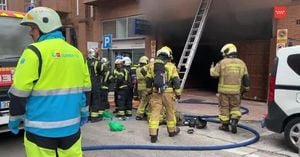In the aftermath of the tragic collapse of the Office of the Auditor General (OAG) building in Chatuchak, Bangkok, ongoing rescue operations have revealed a devastating toll. As of April 2, 2025, the incident, which occurred on March 28 during an earthquake, has claimed the lives of 15 individuals, with 72 others still unaccounted for. The situation has raised significant concerns, particularly among the migrant worker community, many of whom are from Myanmar and were working in the building at the time of the disaster.
The MATTER team visited the site on April 1 to speak with those affected, including construction workers and their families, who are anxiously waiting for news about their loved ones. One worker, identified only as Su, expressed his anguish: "My uncle is still trapped inside. I’ve been waiting for five days now." Su was working at a different construction site when the building collapsed. He recounted how his uncle was on the 19th floor at the time of the incident and rushed to the site as soon as he heard the news. "I’ve seen some bodies, and I didn’t want to, but I had to because one of them might be my uncle," he said, highlighting the emotional toll the disaster has taken on families.
Another worker, Sae Wei Win, who traveled from Mahachai with her family to search for her brother, echoed similar sentiments. "We just want to know if he is alive or not. We don’t need anything else right now," she said, her voice trembling with emotion. The uncertainty surrounding the fate of their loved ones has left many migrant workers feeling helpless, as they face language barriers and a lack of information from authorities.
The communication issues have been exacerbated by the fact that many of these workers are unaware of their rights and the support available to them. Su noted that the process of identifying victims through DNA testing could take 1-2 days, leaving families in limbo. "If there were real-time updates, it would help a lot," he suggested.
As the search and rescue operations continued, concerns about the safety of the construction site emerged. Pau, a local worker, revealed that site supervisors had been discouraging workers from speaking to the media. "If you talk to the press, you won’t be able to wear the company shirt anymore," he recounted, indicating a climate of fear among the workforce.
In light of these events, the Migrant Working Group has called on the government to take immediate action to protect migrant workers and ensure their rights are upheld. They have issued an open letter urging the Ministry of Labor to investigate the circumstances surrounding the building collapse and to provide assistance to all affected workers, regardless of their nationality.
According to the Department of Employment, the government is investigating the incident and has pledged to provide support. However, many workers feel that more needs to be done. "We just want to know the fate of our loved ones," said Tawwan, a translator who has been assisting the families of victims. "They don’t want anything else right now. Just answers and support during this difficult time."
The situation has also raised broader questions about construction safety standards in Thailand. Following the earthquake, concerns have been voiced regarding the structural integrity of high-rise buildings, particularly those housing migrant workers. The Thai Condominium Association has reported that there are 5,994 high-rise buildings in Bangkok, which are covered by insurance totaling 3.8 trillion baht. However, many residents remain unaware of the protections in place.
As Thailand has experienced over 100 earthquakes of magnitude 4.0 or higher in the last decade, the importance of rigorous safety standards has become increasingly apparent. Experts suggest that the recent earthquake could serve as a wake-up call for the construction industry, leading to stricter regulations and improved building practices to prevent future tragedies.
In the wake of the collapse, some believe that the public’s perception of high-rise living may shift. There is speculation that demand for low-rise condominiums may increase as potential buyers seek safer alternatives. The Thai real estate market, already facing challenges, may need to adapt to these changing consumer preferences.
As families continue to wait for news of their loved ones, the emotional toll of the tragedy is palpable. Many are grappling with the uncertainty of their futures and the loss of income due to their inability to work while searching for answers. "We’re not asking for much. Just to know if they’re okay," said Sae Wei Win, reflecting the sentiments of countless others in similar situations.
While rescue efforts persist, the call for accountability and improved safety measures is growing louder. The Migrant Working Group and other advocacy organizations are pushing for the government to ensure that migrant workers receive the support they need and that such tragedies do not occur again.
As the dust settles and investigations commence, one thing is clear: the lives affected by this disaster extend beyond the immediate loss. They highlight a broader issue of safety, rights, and the need for systemic change to protect the most vulnerable members of society. The hope is that this tragedy will not be in vain and that meaningful reforms will emerge from the ashes of this disaster.






